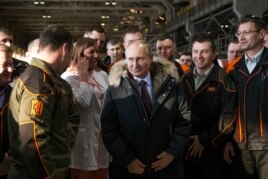07 May, 2018
Russian President Vladimir Putin was sworn in for a fourth term in office on Monday.
Speaking in Moscow, Putin promised to follow an economic program that would improve living conditions across the country. He said that improving Russia's economy would be a major goal of his next six years in office.
Economic growth slowed because of a recession. Russia observers have linked the recession, in part, to international sanctions against the country.
Saying Russia must "use all existing possibilities," the 65-year-old leader promised to work for "a new quality of life, well-being, security and people's health."
Under his leadership, Russia has regained its position as a world leader through military action, including intervening in Syria's war to help its president. Yet Putin has been criticized for doing little to reduce Russia's dependence on energy exports or develop its manufacturing industry.
Russia's economy was hurt by low world oil prices and sanctions linked to the 2014 takeover of Crimea and military involvement in separatists in eastern Ukraine. Between 2014 and 2016, the Russian ruble lost half of its value on international currency markets.

Russian President Vladimir Putin listens to employees of Uralvagonzavod factory in Nizhny Tagil, Russia, March 6, 2018.
In 2017, Russia recorded small economic growth, with the ruble recovering some of its value. But the value dropped about 8 percent more last month after the United States announced new sanctions.
Putin said, "Russia should be modern...It should be ready to accept the call of the times."
In his speech, he spoke about Russia's international role only briefly. He said "Russia is a strong, active, influential participant in international life."
He admitted that Russia faces problems, but said that the country has always faced those problems and succeeded.
Putin was re-elected as president in March, when he received 77 percent of the vote.
He has effectively been the leader of Russia for all of the 21st century. He left the presidency in 2008 because of term limits, but was named prime minister and continued to lead the country until he returned as president in 2012.
Putin became acting president on the last day of 1999 following the surprise resignation of Boris Yeltsin. He was elected to his first four-year term in 2000.
Russian state television broadcast the swearing-in ceremony. It began with Putin working in an office, then putting on a suit coat to begin a long walk through the building housing Russia's Senate. He then got in a car for a short drive to the Grand Kremlin Palace.
Thousands of people attended the ceremony in person. One of the most famous was former German Chancellor Gerhard Schroeder. He is now chairman of Russia's state oil company and one of the loudest Western voices arguing for an end to sanctions against Russia.
Schroeder stood with Prime Minister Dmitry Medvedev, and Putin shook hands with him after the speech.
Soon after the ceremony, Putin officially ordered the dismissal of the Cabinet, but asked Medvedev to serve again as prime minister.
I'm Jonathan Evans.
Jim Heintz reported this story for the Associated Press. Susan Shand adapted his report for Learning English. The editor was George Grow.
Write to us in the Comments Section or on 51VOA.COM.
________________________________________________________________
Words in This Story
sanction – n. an action that is taken or an order given to force a country to obey international rules
suit coat – n. clothing worn over the upper part of the body
role – n. a duty or part performed as part of a process
currency – n. the money that a country uses